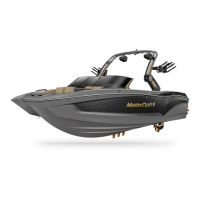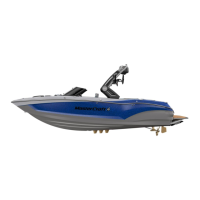breakaway cable is pulled, which applies a braking force to the
trailer. Note that the breakaway system is not intended to lock up
the trailer brakes after separating from the tow vehicle but rather to
apply just enough braking force to keep the trailer from free-wheel-
ing. The breakaway system must be reset manually after it has been
activated.
DO NOT USE THE BREAKAWAY SYSTEM AS A PARKING BRAKE!
Surface rust may build up on the rotor brake surface if the trailer
isn’t used for a week or more. If this occurs, then generally the brake
pads will wipe off the rust in the first few miles of travel. However, if
the trailer has been idle for several months, or it has been frequent-
ly submerged in salt water and the brakes have not been flushed
out (as described earlier in this section of Owner’s Manual), severe
corrosion can occur.
Try the brakes before each trip. On a regular basis, have the brake
lines inspected, necessary adjustments made and any damaged or
worn parts replaced by an authorized MasterCraft dealer.
Wet brakes usually do not hold especially well. If the wheels have
been in water, several brake applications at slow speeds should
dry them out. If the wheel assemblies have been submerged in salt
water, it is important to flush the rotors and calipers thoroughly with
fresh water to minimize subsequent corrosion.
If the stopping capacity does not meet expectations, have the tow
vehicle and the trailer brakes checked for proper operation. The trail-
er brakes should be inspected by an authorized MasterCraft dealer.
Review the tow vehicle manufacturer’s recommendations and
instructions for towing.
If the brakes are hot, before launching your boat, it is a good idea
to allow the brakes to cool first. The sudden change in temperature
when submerging very hot calipers and rotors into water stresses
all the related parts and could cause damage.
If you are unable to back up, check the electronically operated
back-up valve on the actuator, which is connected to the tow vehicle
back up lights. When energized, the valve opens and prevents
pressure build up in the system. When it is energized by shifting the
tow vehicle into reverse, you should hear a noticeable “click” sound.
If you don’t, check that the electrical connection between the tow
vehicle and the trailer is secure.
When parking the trailer, be sure the actuator is fully extended. This
position relieves pressure on the brakes. Corrosion sometimes
causes actuators to freeze in the compressed position. This causes
the brakes to drag and overheat during subsequent outings.
Recommended Brake Fluid
After only a year of use, used brake fluid in the average marine trail-
er may contain as much as two percent (2%) water. Over time, the
percentage will continue to grow and may reach as much as eight
percent (8%). As the concentration of moisture increases, a sharp
drop in the fluid’s boiling point temperature results. As little as one
percent (1%) moisture can lower the boiling point to 369
o
F/187
o
C.

